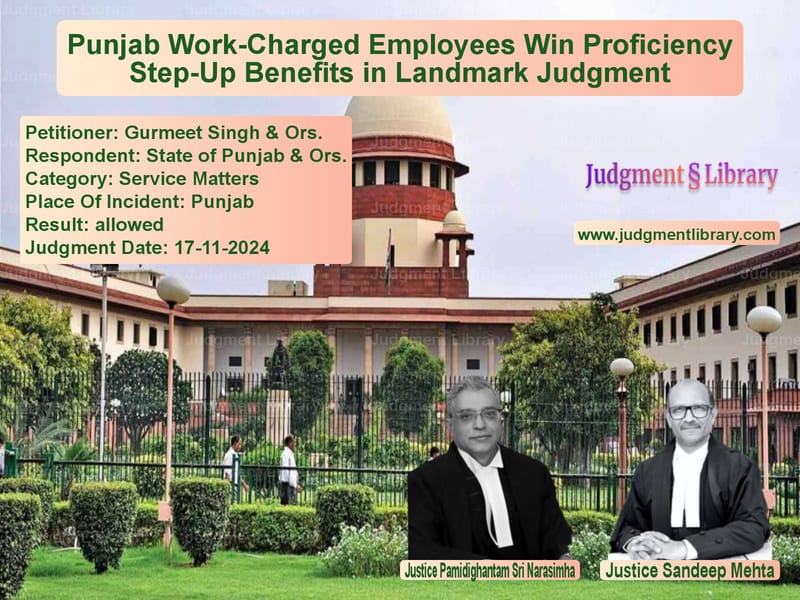Punjab Work-Charged Employees Win Proficiency Step-Up Benefits in Landmark Judgment
In a significant ruling, the Supreme Court of India has upheld the rights of work-charged employees in Punjab, granting them the benefits of the Proficiency Step-Up Scheme, 1988. The case, Gurmeet Singh & Ors. vs. State of Punjab & Ors., revolved around the demand for parity in career progression benefits between regular employees and those initially employed on a work-charged basis.
Background of the Case
The case originated from a long-standing grievance of work-charged employees in Punjab. These employees, initially hired on temporary terms, were later regularized but denied benefits under the Proficiency Step-Up Scheme, 1988. The key developments in this legal battle were:
- The Punjab government introduced the Proficiency Step-Up Scheme, 1988, providing financial benefits for employees upon completing 8 and 18 years of service.
- The employees contended that their work-charged service should be counted towards eligibility for this scheme.
- The Punjab High Court ruled against them, leading to an appeal in the Supreme Court.
Arguments of the Parties
Arguments by the Appellants (Work-Charged Employees)
Senior counsel for the appellants, Shri P.S. Patwalia, presented the following arguments:
- The Punjab government had already granted similar benefits to other employees in the same category, and denying it to the appellants was discriminatory.
- The Policy Circular dated 13th March 1996 explicitly stated that work-charged service would be treated as qualifying service for all pensionary and consequential benefits.
- The Chief Engineer’s Circular dated 12th April 2005 indicated that similar employees were granted benefits, contradicting the government’s denial.
- Multiple court orders had already recognized these claims, setting a precedent that should be applied to the appellants.
Arguments by the Respondents (State of Punjab)
Additional Advocate General Shri Shadan Farasat, representing the Punjab government, countered with the following arguments:
- Only employees who went to court and obtained specific relief were granted benefits, and the appellants had not initially secured such orders.
- The Proficiency Step-Up Scheme, 1988, and the Assured Career Progression Scheme, 1998, should be treated similarly, and work-charged service was not counted for the latter.
- The state had limited financial resources and could not grant broad relief unless specifically directed by the courts.
Supreme Court’s Observations and Judgment
After carefully examining the arguments, the Supreme Court found several flaws in the government’s stance:
- The Proficiency Step-Up Scheme, 1988, was distinct from the Assured Career Progression Scheme, 1998, and should be treated independently.
- The government had already granted benefits to similarly placed employees, proving that work-charged service was eligible for consideration.
- The Industrial Tribunal of Punjab had ruled in favor of work-charged employees, and the state had accepted and implemented this ruling in other cases.
- The Punjab government had failed to justify why the appellants were treated differently from others who received benefits.
In its judgment, the Supreme Court ruled:
“The differential treatment could not have been meted out to the appellants herein who formed a part of the same establishment and were similarly situated to the employees who were granted the benefits under the Proficiency Step-up Scheme, 1988.”
Accordingly, the Court directed:
- The appellants’ work-charged service should be counted towards eligibility under the Proficiency Step-Up Scheme, 1988.
- The Punjab government must release all financial benefits due to the appellants within six months.
- The impugned judgments of the Punjab High Court were reversed and set aside.
Impact of the Judgment
The Supreme Court’s decision has significant implications:
- It ensures fair treatment for work-charged employees across Punjab.
- It establishes a legal precedent that prevents arbitrary denial of benefits based on employment classification.
- It clarifies the legal status of work-charged service in career progression schemes.
- The ruling compels the Punjab government to follow its own policies uniformly and consistently.
Conclusion
This ruling is a victory for thousands of work-charged employees in Punjab who have long sought parity in career progression benefits. The Supreme Court has reaffirmed that government policies must be applied fairly and that employees cannot be arbitrarily excluded from benefits that others in similar positions receive. The decision also sets an important precedent for future employment and labor disputes involving work-charged staff in government departments.
Petitioner Name: Gurmeet Singh & Ors..Respondent Name: State of Punjab & Ors..Judgment By: Justice Pamidighantam Sri Narasimha, Justice Sandeep Mehta.Place Of Incident: Punjab.Judgment Date: 17-11-2024.
Don’t miss out on the full details! Download the complete judgment in PDF format below and gain valuable insights instantly!
Download Judgment: gurmeet-singh-&-ors.-vs-state-of-punjab-&-or-supreme-court-of-india-judgment-dated-17-11-2024.pdf
Directly Download Judgment: Directly download this Judgment
See all petitions in Promotion Cases
See all petitions in Pension and Gratuity
See all petitions in Public Sector Employees
See all petitions in Judgment by P.S. Narasimha
See all petitions in Judgment by Sandeep Mehta
See all petitions in allowed
See all petitions in supreme court of India judgments November 2024
See all petitions in 2024 judgments
See all posts in Service Matters Category
See all allowed petitions in Service Matters Category
See all Dismissed petitions in Service Matters Category
See all partially allowed petitions in Service Matters Category







